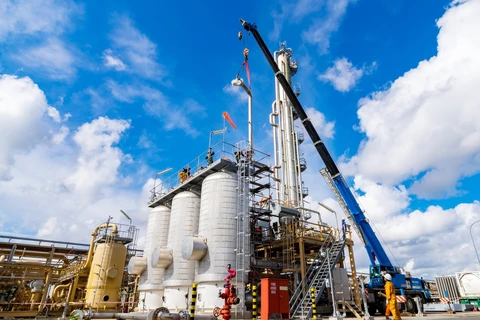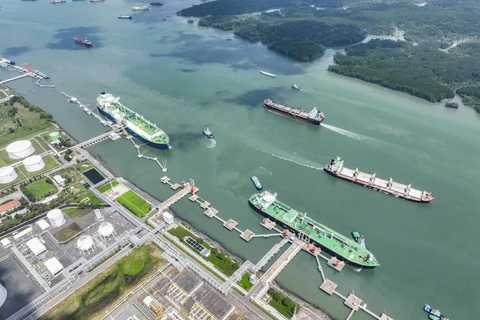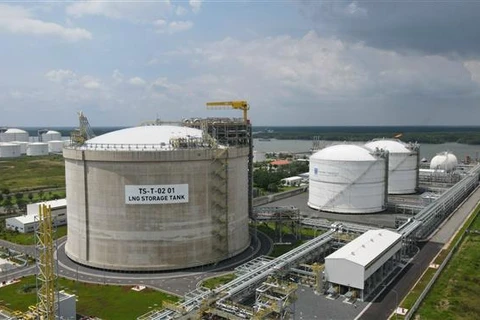 Workers perform maintenance of Hai Thach gas field, situated in Nam Con Son basin offshore of southern Vietnam. (Photo: VNA)
Workers perform maintenance of Hai Thach gas field, situated in Nam Con Son basin offshore of southern Vietnam. (Photo: VNA) Hanoi (VNS/VNA) - Early this week, oil specialists and economists convened at a seminar to deliberate on the importance of maintaining fuel security for electricity generation in Vietnam, given the diminishing yields from national gas fields.
During the event, organised by Petrovietnam and PV Gas in Ba Ria-Vung Tau province, Huynh Quang Hai, Deputy General Director of PV GAS, underscored the annual decline of approximately 10% in domestic gas production, attributing it to the prolonged exploitation of gas fields.
This downward trend is anticipated to lead to a domestic gas deficit for future electricity production.
The seminar revealed that the annual requirement for domestic gas in electricity generation hovers between 5 and 6 billion cubic metres. Presently, only about 3 billion cubic metres are being supplied to power stations. This shortfall necessitates the temporary cessation of gas supply to other consumers when the power generation system demands higher gas capacities.
The shortage of gas for electricity production in Vietnam is exacerbated by the delay in the operation of projects like the Nhon Trach 3 & 4 power plant, which has a gas demand of about one million tonnes per year (equivalent to 1.2 billion cubic metres of gas per year). Meanwhile, the Long An 1 and 2 gas power project has also only recently received the Ministry of Industry and Trade's appraisal of its basic design.
He mentioned that importing liquefied natural gas (LNG) to compensate for the shortage of domestic gas was considered an inevitable alternative.
In addition, the absence of an LNG price policy mechanism and the lack of a defined authority to approve LNG gas purchase contracts are key obstacles in developing imported LNG projects. Additionally, the transportation and storage costs associated with LNG imports also pose further challenges.
In the past, domestic gas development in Vietnam, such as the Nam Con Son gas field, benefited from clear regulations on gas prices and offtake contracts. This provided a solid foundation for the development of domestic gas fields. However, the situation is different for imported LNG. The pricing mechanism for imported LNG is not yet established, making it difficult to determine the economic viability of LNG-based power projects.
Moreover, importing LNG involves additional costs, including transportation expenses to bring LNG from abroad to Vietnam and the infrastructure required to store LNG at extremely low temperatures.
Taking an example, the Nhon Trach 3&4 gas power project has encountered challenges in negotiating a power purchase agreement (PPA) between PV Power and Vietnam Electricity Group (EVN). One of the key issues is related to the commitment of annual power purchase contracts from EVN.
EVN has also reported to the Ministry of Industry and Trade that the price of LNG is currently 1.5 times higher than the price of domestic gas. This significant price difference makes the cost of generating electricity from imported LNG too high. As a result, it becomes difficult for the Nhon Trach 3 & 4 project to operate in the electricity market. Moreover, the high cost of imported LNG also affects EVN's overall electricity purchase plans, creating challenges for financial balance.
According to Huynh Quang Hai, PV GAS has taken steps to meet the demand for LNG for clean electricity production in Vietnam. They have already put phase 1 of the Thi Vai LNG warehouse into operation in Ba Ria-Vung Tau, with a capacity of 1 million tonnes.
PV GAS is now preparing to implement phase 2 of the project, which aims to increase the capacity of the Thi Vai LNG warehouse to 3 million tonnes. This expansion is intended to align with the demand for LNG gas required for clean electricity production as specified in the approved Power Development Plan VIII.
Also at the seminar, Dr. Ngo Tri Long, former Director of the Ministry of Finance's Price and Market Research Institute, highlighted the need for the Government to address several issues related to domestic LNG gas power projects. Completing policies and incentive mechanisms was the main solution. These measures should include tax incentive policies, loan support mechanisms, and clear regulations on the approval and construction process of LNG projects.
Investors of the Nhon Trach 3 & 4 power plant project stated that this project was the first LNG power project in the country and there was no precedent for an output offtake contract for this type of project. They believed that certain measures should be taken to promote investment in LNG power projects in Vietnam, such as the early issuance of a power generation price framework specifically for LNG projects.
Many experts suggested that the involvement of State management agencies was crucial. These agencies can play a significant role by providing clear policy mechanisms to promote LNG consumption in Vietnam./.























